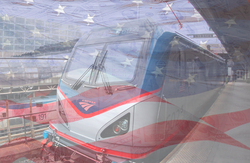 The administration of the South American President Barack Obama over the past 5 years has spent about $ 11 billion on high-speed Railways. The administration of the South American President Barack Obama over the past 5 years has spent about $ 11 billion on high-speed Railways.
The expenditure of these funds was considered ineffective in consequence of mistakes civil servants.
South American authorities for a long time worked on the project of creation of a system of high-speed rail transport. To date, the desired outcome of this project has not yet been reached as high-speed system is not yet fully functioning.
High speed trains had to be "branded" project in the transport sector for President Obama, however the US in this area as before, behind Europe and China, and almost 11 billion spent since 2009 on the creation of a more rapid passenger trains, for the most part, have gone nowhere", - informs the foreign edition of the New York Times.
Republican opposition and the adherents of the public placed the blame for the inefficient financial cost of the Obama administration. The main causes of failure in the implementation of this project became strategic miscalculations of Washington. So, the authorities of the USA, instead of having to create a new system from zero, attempted to improve the existing Railways, the operator of which is the company Amtrak. As emphasized by professionals, using the already existing ways newest trains will not be able to reach speeds of more than 177 kilometers per hour.
In 2011, the South American President made a statement in which he said that the administration wants to make for 25 years, 80% of inhabitants of the USA have access to high-speed Railways". "With their help you will be able to reach a suitable place about twice as faster than by car. According to some estimates, it is faster than fly a plane, for it is not necessary to pass the test," persuaded the President. "At the same time, Obama's term comes to an end, and according to some experts, the President's words were fantasies", - specifies a foreign edition.
sections: Economics, World News, Accidents
|